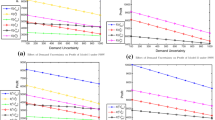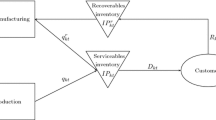Abstract
We study the problem of optimizing the sampling and procurement decisions in a remanufacturing system under stochastic yield of returns in a single-period setting. Returned products are characterized by uncertainty regarding their ability to be successfully remanufactured. This uncertainty is formulated as a variable probability of each returned unit in a batch to be remanufacturable (returns yield). We study the impact of returns yield on the optimal procurement policy and the benefits of sampling inspection of returns prior to the procurement decision. It is shown that sampling inspection improves the procurement decisions since it allows the Bayesian updating of the prior information regarding the returns yield. We derive analytical expressions for the determination of the economically optimal procurement quantity and structural properties that facilitate the optimization procedure and provide useful insights. The determination of the economically optimal sample size is also discussed and the benefits of sampling are illustrated through numerical examples.
Similar content being viewed by others
Abbreviations
- D :
-
Demand for remanufactured products
- Q :
-
Procurement quantity
- Q v :
-
Remanufacturable units in Q
- v :
-
Sales revenue per unit
- c p :
-
Procurement cost per unit
- c in :
-
Inspection cost per unit in the batch after procurement
- c r :
-
Remanufacturing cost per unit
- c n :
-
Inspection cost per unit in the sample before procurement
- n :
-
Sample size
- r :
-
Number of remanufacturable units in the sample
- p :
-
Probability of a returned unit to be remanufacturable (yield)
- \({\bar{p}}\) :
-
Expected yield of returns
- p cr :
-
Critical ratio of p
- P(r|n):
-
Probability to find r remanufacturable units in the sample n
- P(p):
-
Probability that the yield is p
- P(p|n,r):
-
Probability that the batch yield is p given the number of remanufacturable units r in the sample n
- P(r|p,n):
-
Probability to find r remanufacturable units in the sample given that the batch yield is p
- f(p):
-
Probability density function of the yield
- f(p|n,r):
-
Probability density function of the yield given the number of remanufacturable units r in the sample n
- \({Q_{p}^\ast }\) :
-
Optimal procurement quantity when the batch yield is p
- \({Q_{r/n}^\ast }\) :
-
Optimal procurement quantity when the number of remanufacturables in the sample n is r
- TP(Q|p):
-
Expected total profit for procurement quantity Q given p
- TP (Q):
-
Expected total profit for procurement quantity Q, taking into account all possible values of p
- TP(Q |n, r):
-
Expected total profit for procurement quantity Q, given the number of remanufacturable units r in the sample n
- TP(n ):
-
Expected total profit for sample size n, taking into account all possible values of r and their respective optimal procurement quantities (\({Q_{r/n}^\ast }\))
- TP(n )− :
-
Expected total profit for sample size n excluding sampling cost
- TP * :
-
Maximum expected total profit if the exact yield is known a priori
- MP(Q |p):
-
Marginal profit of procuring Q + 1 units instead of Q given p
- MP(Q ):
-
Marginal profit of procuring Q + 1 units instead of Q, taking into account all possible values of p
References
Aras N, Boyaci T, Verter V (2004) The effect of categorizing returned products in remanufacturing. IIE Trans 36: 319–331
Bakal IS, Akcali E (2006) Effects of random yield in reverse supply chain with price-sensitive supply and demand. Prod Oper Manag 15: 407–420
Ben-Daya M, Noman SM (2008) Integrated inventory and inspection policies for stochastic demand. Eur J Oper Res 185: 159–169
Ben-Daya M, Noman SM, Hariga M (2006) Integrated inventory and inspection policies with deterministic demand. Comput Oper Res 33: 1625–1638
Blackburn JD, Guide VDR Jr, Souza GC, Van Wassenhove LN (2004) Reverse supply chains for commercial returns. Calif Manage Rev 46: 6–22
Debo LG, Savaskan RC, Van Wassenhove LN (2004) Coordination in closed-loop supply chains. In: Dekker R, Fleischmann M, Interfurth K, Wassenhove LN (eds) Reverse logistics: quantitative models for closed loop supply chains. Springer, Berlin, pp 295–311
Ferguson M, Guide VDR Jr, Koca E, Souza GC (2009) The value of quality grading in remanufacturing. Prod Oper Manag 18: 300–314
Ferrer G (2003) Yield information and supplier responsiveness in remanufacturing operations. Eur J Oper Res 149: 540–556
Ferrer G, Ketzenberg ME (2004) Value of information in remanufacturing complex products. IIE Trans 36: 265–277
Galbreth MR, Blackburn JD (2006) Optimal acquisition and sorting policies for remanufacturing. Prod Oper Manag 15: 384–393
Guide VDR Jr, Gunes ED, Souza GC, Van Wassenhove LN (2008) The optimal disposition decision for product returns. Oper Manag Res 1: 6–14
Guide VDR Jr, Teunter RH, Van Wassenhove LN (2003) Matching supply and demand to maximize profits from remanufacturing. MSOM 5: 303–316
Guide VDR Jr, Van Wassenhove LN (2001) Managing product returns for remanufacturing. Prod Oper Manag 10:142–155
Inderfurth K, Langella IM (2006) Heuristics for solving disassemble-to-order problems with stochastic yields. OR Spectrum 28: 73–99
Ketzenberg ME (2009) The value of information in a capacitated closed loop supply chain. Eur J Oper Res 198: 491–503
Ketzenberg ME, Van der Laan E, Teunter RH (2006) Value of information in closed loop supply chains. Prod Oper Manag 15: 393–406
Lee HL, Rosenblatt MJ (1985) Optimal inspection and ordering policies for products with imperfect quality. IIE Trans 17: 284–289
Nikolaidis Y (2009) A modelling framework for the acquisition and remanufacturing of used products. Int J Sustain Eng 2: 154–170
Peters MH, Schneider H, Tang K (1988) Joint determination of optimal inventory and quality control policy. Manage Sci 34: 991–1004
Robotis A, Bhattacharya S, Van Wassenhove LN (2005) The effect of remanufacturing on procurement decisions for resellers in secondary markets. Eur J Oper Res 163: 688–705
Simon M, Bee G, Moore P, Pu J, Xie C (2001) Modeling of the life cycle of products with data acquisition features. Comput Ind 45: 111–122
Tagaras G, Zikopoulos C (2008) Optimal location and value of timely sorting of used items in a remanufacturing supply chain with multiple collection sites. Int J Prod Econ 115: 424–432
Teng SG, Ho SM, Shumar D (2005) Enhancing supply chain operations through effective classification of warranty returns. Int J Qual Reliab Manage 22: 137–148
Teunter RH, Flapper SDP (2010) Optimal core acquisition and remanufacturing policies under uncertain core quality fractions. Eur J Oper Res. doi:10.1016/j.ejor.2010.06.015
Vadde S, Kamarthi SV, Gupta SM (2007) Optimal pricing of reusable and recyclable components under alternative product acquisition mechanisms. Int J Prod Res 45: 4621–4652
Yano CA, Lee HL (1995) Lot sizing with random yields: a review. Oper Res 43: 311–334
Zhang X, Gerchak Y (1990) Joint lot sizing and inspection policy in an EOQ model with random yield. IIE Trans 22: 41–47
Zikopoulos C, Tagaras G (2008) On the attractiveness of sorting before disassembly in a remanufacturing facility. IIE Trans 40: 313–323
Author information
Authors and Affiliations
Corresponding author
Rights and permissions
About this article
Cite this article
Panagiotidou, S., Nenes, G. & Zikopoulos, C. Optimal procurement and sampling decisions under stochastic yield of returns in reverse supply chains. OR Spectrum 35, 1–32 (2013). https://doi.org/10.1007/s00291-010-0234-z
Published:
Issue Date:
DOI: https://doi.org/10.1007/s00291-010-0234-z




